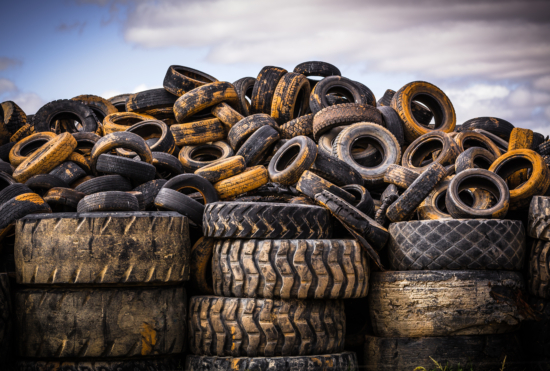Could Red Sea shipping issues be catalyst for UK to increase circular economy capacity utilisation?
 End of life tyres (Photo: Scott Donkin – stock.adobe.com)
End of life tyres (Photo: Scott Donkin – stock.adobe.com)
Time for the UK to do the right thing and stop its carbon leakage – Tyre Recovery Association
The UK’s exportation of end-of-life tyres (ELTs) is coming under further scrutiny considering the current crisis in the Red Sea, which is disrupting shipments to the Indian subcontinent, a typical route for many the country’s ELT arisings. Research reveals that this might total as much as 300,000 tonnes of ELTs. With the economic feasibility of these exports under threat, the Tyre Recovery Association is asking for governmental support in promoting the utilisation of currently dormant capacity to process ELTs within the country. The positive case for this is that useful materials can be extracted from ELTs, supporting the country’s circular economy with the residual value offered by proper processing. Meanwhile, the TRA adds, the country would also be doing the right thing in not allowing ELTs to become a highly pollutive issue for authorities in the Indian subcontinent, where UK waste supports unethical, dangerous, and illegal businesses.
The TRA called on Britain to “face up to the reality of its actions if it is to live up to His Majesty’s Government rhetoric.” It said “the disruption caused by Houthi attacks on international shipping have lifted the veil many have been choosing to ignore, the UK is not building a circular economy but double dipping with unnecessary carbon leakage.”
Up to 300,000 tonnes of ELT waste exported
The TRA’s case for retaining the country’s ELTs is further supported by the potential for gains within the UK tyre industry and its tyre recovery sector. Latest figures reveal 250-300,000 tonnes of ELTs are exported from the UK per annum, yet the UK has at least 150,000 tonnes of idle domestic recycling capacity, the TRA explains. While there is the ethical issue of what happens to the ELTs when they reach their destination, the TRA adds that merely exporting the ELTs on carbon producing ocean tankers means additional, unnecessary pollution.
“It is time our government does the right thing and stop the UK’s carbon leakage.” – Peter Taylor OBE, secretary general, Tyre Recovery Association
According to the German statistics company, Statista, who looked at product tankers operating in the United Kingdom, the ships ELT exports are carried on produced the equivalent of 9.02 grams of CO2 per metric tonne of goods shipped per kilometre in 2023. With shipping now diverting via the Cape of Good Hope to avoid the Red Sea the journey lengths are estimated to have almost doubled, increasing carbon emissions by one third.
Government figures on rubber export released earlier this month show that, having completed an unnecessary carbon producing journey, 75 per cent of these ELT waste tyre exports end up being sold into the Indian subcontinent. It says that much of these Indian tonnages are dealt with in a manner that is highly polluting, with the Indian authorities fighting an uphill battle to end the illegal and unethical distribution of ELT waste tyres for use on vehicles and the highly polluting practice of back street pyrolysis. The life of an average worker in one of these micro and illegal pyrolysis plants is estimated at seven years, demonstrating quite how noxious the by-products from burning are to both humans and the environment.
Peter Taylor OBE, secretary general of the TRA, said: “It beggars belief that the government continue to enable CO2 producing exports while UK capacity lies idle. The UK tyre industry welcomes the opportunities that come from the circular economy advocated for by ministers, yet those same ministers appear incapable of pushing through the rule changes that make it work. Without much needed updating of UK regulations our nation will continue to double dip in unnecessary carbon production, first from the carbon created by ships loaded with ELTs for export and then those ELTs are unloaded into a market that is sadly rife with abuse.
“The TRA want to see responsible recycling at the heart of our industry, but the regulatory framework needed lags way behind.
“It is time our government does the right thing and stop the UK’s carbon leakage.”



Comments